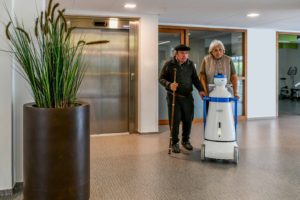 Home care continues to rock with the third move in two weeks. Payer giant Humana closed its acquisition of home care giant Kindred at Home, completing the acquisition of the approximately 60% Humana did not already own for $5.7 billion. Kindred provides home health, hospice, and personal care services to over 550,000 patients annually, making it the largest US home health company. Humana will integrate Kindred into their Home Solutions business, sunsetting the Kindred name for CenterWell Home Health starting in 2022. CenterWell is payer-agnostic, which is a fancy way of saying that they sell to other payers. An interesting nugget in the release is that Home Solutions has an interim president, Greg Sheff. FierceHealthcare
Home care continues to rock with the third move in two weeks. Payer giant Humana closed its acquisition of home care giant Kindred at Home, completing the acquisition of the approximately 60% Humana did not already own for $5.7 billion. Kindred provides home health, hospice, and personal care services to over 550,000 patients annually, making it the largest US home health company. Humana will integrate Kindred into their Home Solutions business, sunsetting the Kindred name for CenterWell Home Health starting in 2022. CenterWell is payer-agnostic, which is a fancy way of saying that they sell to other payers. An interesting nugget in the release is that Home Solutions has an interim president, Greg Sheff. FierceHealthcare
While planned since earlier this year, the shakeup in the sleepy home health segment in usually dozy August has been substantial, and at premium prices. Honor’s acquired Home Instead [TTA 14 Aug] with a valuation of $2.1 billion and the Sharecare conglomerate bought CareLinx for $65 million [TTA 19 Aug].
In another hot area, social determinants of health (SDOH), NYC-based care coordination platform Unite Us acquired Carrot Health for an undisclosed sum. Carrot Health is a consumer data and health data set that powers over 500 proprietary predictive models. Carrot’s team will be absorbed into the Unite Us current structure. Both products will be sold together and separately as Unite Us positions the company as the only national company to integrate health and social care. Back in March, Unite Us closed a $150 million Series C. This follows on the Wellsky acquisition of SDOH provider Healthify earlier this month to bolster its community care platform [TTA 4 Aug]. Release, FierceHealthcare, Mobihealthnews
Women’s and family health gaining popularity and funding. Another Carrot, Carrot Fertility, raised a $75 million Series C funding, led by the deep-pocketed Tiger Global Management. Their current funding totals $115 million. Carrot Fertility, based in San Francisco, provides fertility benefits for generous companies like Peloton, Box, Slack, and Eventbrite in more than 55 countries. FierceHealthcare
And while we are on women’s health, Maven Clinic, a women and family health-oriented digital health provider, reached unicorn ($1 billion) valuation status with a $110 million Series D fund raise led by a female partner at Lux Capital with backing from Oprah Winfrey. Maven pitches itself to employers and health plans as a virtual clinic for women’s and family health, offering care and support for fertility, pregnancy, and parenting. This Editor looks forward to the day where specialized women’s and family health services are part of routine care, and news about a provider wouldn’t need this type of spin to get noticed. (It’s like US car companies in the 1950s bringing in women designers to make cars that appealed especially to women. Buick and Jordan figured that out in the 1920s.) FierceHealthcare, TechCrunch, plus a loquacious blog post from founder Kate Ryder
And speaking of babies, Privia Health, one of the larger management services organizations (MSOs) for physician practices, is partnering with virtual maternity care Babyscripts for pregnancy and post-partum care. The Babyscripts services will be integrated into Privia’s Women’s Health provider group. DC-based Babyscripts is small with only about $20 million in funding through Series B (Crunchbase) but addresses the big problems of maternal and post-pregnancy mother and baby care, including maternal deaths. Privia providers will be able to access Babyscripts’ remote patient monitoring for mental health, hypertension, preeclampsia. and gestational diabetes, as well as apps for educational content. Mobihealthnews
Diagnostic monitor Tyto Care is partnering with Prisma Health, the largest healthcare system in South Carolina, for remote diagnostics and treatment during video consults. Their physician network will be equipped to provide their patients and Prisma employees with convenient, secure, and clinic-quality diagnostics using the Tyto Care kit during telehealth visits. Release, Mobihealthnews








Most Recent Comments